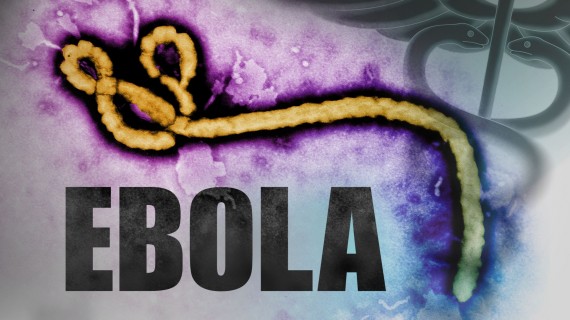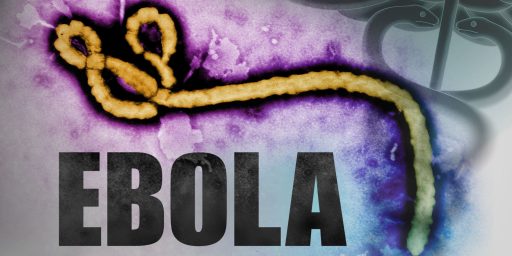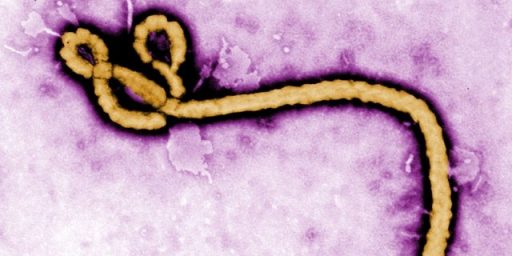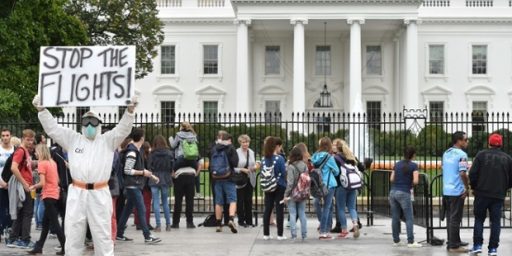W.H.O. Declares 2014 Ebola Outbreak Officially Over
The World Health Organization has declared the Ebola Outbreak that began in 2014 to be officially over.

The World Health Organization has declared that the Ebola outbreak that began last year and, for the first time, brought the disease to populated areas in North America and Europe, is officially over:
DAKAR, Senegal — The World Health Organization declared on Thursday the end to the deadliest Ebola outbreak on record, which killed and sickened tens of thousands of people in West Africa, even as it cautioned that more flare-ups of the disease were likely.
The announcement in Geneva came after a recent chain of cases in Liberiawas snuffed out, marking the first time since the start of the epidemic two years ago that Guinea, Liberia and Sierra Leone — the three countries that were hardest hit by the virus — had reported zero cases for at least 42 days, or two incubation periods of the virus.
Margaret Chan, the director general of the W.H.O., hailed the “monumental achievement” in curbing the outbreak, which, the United Nations said, killed more than 11,300 people and infected more than 28,500. At the height of the outbreak, the bodies of victims piled up in the streets of towns and cities that were overwhelmed and ill equipped to cope with the scale and speed of transmission.
But in a statement released in Geneva, Ms. Chan added that “our work is not done and vigilance is needed to prevent new outbreaks.”
The immediate threat stems from persistence of the virus in body fluids, notably in the semen of male survivors, up to a year after they are cured of the disease and show no symptoms, said Rick Brennan, the W.H.O.’s director of emergency risk management, in Geneva.
Ten flare-ups had been reported across the three countries in the last nine months, four of them in Liberia and three each in Guinea and Sierra Leone, “and we are anticipating more,” Mr. Brennan said.
The risk, although significant, was low, he said. The new cases had occurred on average 27 days apart, but there have been none since mid-November. Any risk diminishes over time, as survivors’ immune systems clear out the virus.
W.H.O. officials said health authorities in the affected countries had put in surveillance and rapid response mechanisms for managing the risk and that those measures had proved effective in containing the flare-ups.
“People of course want to return to a normal, but it’s a new normal,” said Peter Graaff, a W.H.O. director who is in charge of Ebola response. “Ebola has been added to a number of their diseases that affect the population.”
The three West African countries now have the world’s biggest pool of expertise in handling the Ebola virus and greater professionalism, confidence and resources for dealing with it, he said.
Their approach, Mr. Graaf said, is that “it’s a problem, a big problem, it’s going to affect us again, but we know how to handle it.”
Sierra Leone was declared free of Ebola transmission in November and Guinea at the end of December; Liberia was declared Ebola free in May but then reported a few new cases.
“Today is a monumental day of achievement — the end of human-to-human transmission of the Ebola virus in the region and Liberia. It is a collective effort for the international community and the people of Liberia for being once more Ebola-free,” Tolbert Nyenswah, Liberia’s deputy minister of public health said in a phone interview. “It does not mean that we have put our tools down and lay down our guys. We keep moving on with our surveillance system.”
This Ebola outbreak became big international news, of course, because of the fact that it brought the disease to the First World for the first time since the virus was first identified back in 1976 and revealed quickly and starkly how vulnerable a First World nation could be to an exotic Third World disease thanks to the vast transportation infrastructure that has developed over the ensuing forty years. It began, of course, with the case of Timothy Eric Duncan, a Liberian citizen who had been infected before flying to the United States, but who didn’t begin displaying symptoms until long after he had left Liberia and successfully made it through the screening that health authorities there required all international travels to go through. Once arriving in the United States, Duncan was initially sent home from an Emergency Room in Dallas in part because medical personnel didn’t recognize the initial symptoms of Ebola and in part due to a communication breakdown between those personnel and the treating physicians on duty. Duncan didn’t check into an American hospital again until it was far too late for him to be treated. Ultimately, he passed away, but not before infecting two health care workers at the hospital he was admitted to, Nina Pham andAmber Ray Vinson, who ended up having to undergo intensive treatment of their own that ended up being successful in both cases. Meanwhile, as the outbreak continued to devastate West Africa, several health workers who were infected with the virus were brought back to the United States for intensive treatment which successfully cured them of Ebola.
Domestically, the Ebola situation became political when Dr. Craig Spencer, a doctor living in New York City who had been in West Africa returned to New York City and started displaying symptoms of Ebola nearly a week after he returned home, at which time he was admitted for treatment and, ultimately, released after the virus was eradicated from his body. The prospect of someone with the Ebola virus roaming a major American city, combined with the fact that the United States was in the middle of an election year meant that there would be an inevitable political reaction. The Spencer case and the prospect of health care workers who may have been exposed to Ebola returning to the United States, led to the inevitable political reactions. Restrictions were implemented at airports accepting flights from the area of the Ebola outbreak. That wasn’t enough for New Jersey Governor Chris Christie and New York Governor Andrew Cuomo, though, both of whom used their authority over the New York City area airports toimpose far greater restrictions on people arriving from West Africa. This is led to the controversy involving a nurse named Kaci Hickox comes in and helped define the panicked, political response of many American politicians. Hickcox was detained at Newark Airport after arriving home from West Africa and not allowed to continue on to her connecting flight. Instead, she was taken into custody and in Newark, New Jersey before being allowed to return home to Maine. Once in Maine, that state’s Republican Governor Paul LePage, who just happened to be running for re-election, attempted to impose severe restrictions on Hickox’s liberty notwithstanding the fact that she displayed absolutely no symptoms of having the Ebola virus and that asymptomatic patients are not contagious. Governor LePage’s efforts were derailed by a Maine State Court Judge, who limited the requirements placed on Hickox to keeping local health authorities informed of her condition and location during the incubation period for the disease. Hickcox has since filed a lawsuit against New Jersey Governor Chris Christie over her detention in the Garden State.
Ironically, the Ebola Panic in the United States was going on at the same time that it was slowly becoming clear that the outbreak in West Africa was fading and had long ago passed the point where it could have turned into the kind of epidemic that would have threatened to take even more lives than it ultimately did. This happened thanks in large part to the aggressive response of the World Health Organization and organizations such as Doctors Without Borders, as well as assistance from the United States and other nations who were interested in stopping the disease at its source so that it didn’t become a problem in their nations or, even worse, spread to areas where it could have made its way through large urban populations in places such as India or South America. Today’s announcement shows that these efforts were largely successful.
Despite the success, of course, there are still plenty of lessons that can be learned from this outbreak that will need to be applied going forward. The first lesson, of course, is that the era when exotic disease like Ebola are easily confined to areas like West Africa is basically over. We live in an interconnected world and, as we learned, it wasn’t all that difficult for someone who was infected with the disease to travel long distances before they displayed symptoms of the disease or became infectious. Going forward, we’ll need to find ways to become more aware of how to screen travelers from parts of the world where these types of diseases originate. Health care professionals in the United States an Europe will need to be better educated about how to diagnose possible cases of diseases like Ebola, and how to treat patients that may be positive for the virus so that they don’t spread the virus to health care workers and others. National governments will need to develop and maintain screening processes that protect the general public while also safeguarding individual liberty. Additionally, public health resources in the Third World need to be improved so that outbreaks can be recognized and controlled more rapidly, especially since they pose a more immediate threat to massive cities such as Lagos than they do to the United States, Europe, and the rest of the world. In many ways, the 2014 Ebola outbreak was fortunate for the West in the sense that it taught us just how easily exotic diseases can travel. Let’s hope we learn the right lessons from what happened.




Congratulations and thank you to the scientists and healthcare workers who achieved this important work. Shame and scorn to those who howled ignorant jeremiads for some personal gain.
Obviously, there are many dangerous microbiologic threats in this world that modern travel speeds can potentiate. We need to strengthen international organizations such as WHO in order to remain vigilant.
Many health care professionals believe it is only a matter of time before we have a world wide pandemic. We have rapidly mutating microorganisms that are resistant to antibiotics. We have a transportation system that allows us to get from one part of the world to another in hours – a brand new vector.
I guess our friends on the right will have to get back to fearing Muslims and Mexicans. .
The whole Ebola crisis really sums up the state of the modern Republican party. 100% fearmongering from the start, no offering of solutions, just find a few scapegoats and run with it. Almost all Republican leaders showed a complete lack of… leadership. It was nice to have adults in charge, imagine if Trump or Cruz or any of the current GOP candidates had been president.
It got no coverage at all, but I was really glad Obama talked about Ebola during the SOTU. That crisis was a crystallizing moment, in regards that it pitted a view of the United States as a globally engaged, self-confident power pursuing enlightened self-interest viz. a view of the United Stats defined by fear and hatred of the outside world.
@SenyorDave:
In Christie’s case no imagination is required. We saw how he responded.
Whatever happened to the fear-mongering morons who
blamed President Obama for the wide-spread Ebola Epidemic in America that killed
millionsactually, it was 2 people?Now I remember, they’re the majority governing political party in the House and the Senate. Nevermind.
@al-Ameda: Geez, 2 people here, 4 people in Benghazi … Obama is nearly at Bush Jr. levels here (if you first multiply by a thousand).
P.S. Only counting American deaths caused by sitting President (because only Americans count … duh!)
@Ron Beasley:
Well only if “brand new” == in the past 80 or so years
Where are Jack and JKB…who a year ago…were ranting about competence and urging internment???
Oh, right. Now they want to send muslims to internment camps.
I guess as long as they get to send someone to an internment camp……
@C. Clavin:
Come on dude, you know it was only through the courage, fortitude, and level-headedness of patriots such as Jack, Jenos, & JKB that we got through this crisis that threatened the very existence of America…
@anjin-san: I often wonder how the redstate.com, etc. fans live with themselves months after Ebola, Jade-Helm, etc. are over and their predictions were, once again, completely wrong.
That level of self-awareness is staggeringly stupid.
Lasted a full 8 hours http://www.bbc.com/news/world-africa-35320363
@Tony W: Motivated reasoning.
The history of this stuff in the United States goes back over 200 years to the Illuminati. There’s always been something that was going to destroy us all. Orwell was right. After a few years of the Illuminati we had always been at war with the Freemasons. (IIR this history trivia correctly.)
@Mu:
See Doug’s post above in which the pasted article says:
And now we have the explanation for why I didn’t post on this particular news item despite my dozens of posts on the oubreak. They’ve just discovered another case, a fatality.
The announcement was premature.
The announcement of one death is different from the question of whether or not there is an “outbreak,” pandemic, or epidemic.
What is undetermined is whether Ebola has become endemic in West Africa. For that we’ll need to wait.
@Dave Schuler: Didn’t they have a promising vaccine a few months back?
guess the “who’s” taunting revived it?